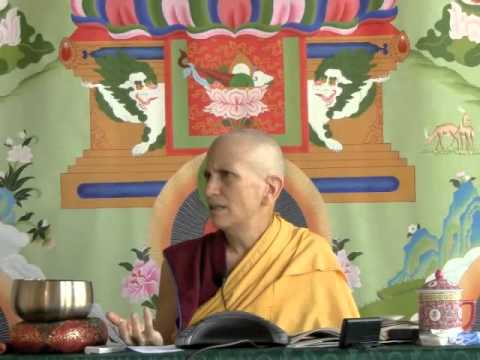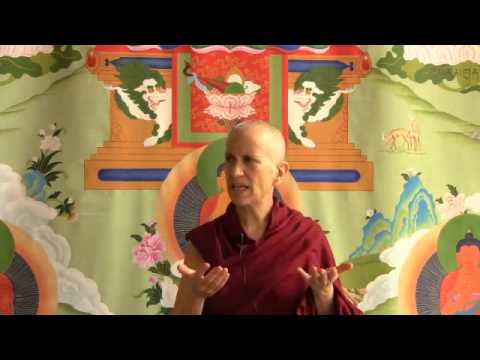Mindfulness for ethics, concentration, and wisdom
Stages of the Path #118: The Fourth Noble Truth
Part of a series of Bodhisattva's Breakfast Corner talks on the Stages of the Path (or Lamrim) as described in the Guru Puja text by Panchen Lama I Lobsang Chokyi Gyaltsen.
- How mindfulness relates to all three higher trainings
- Keeping precepts
- How mindfulness is important in concentration and wisdom
I wanted to just talk a little bit about how mindfulness that we create in practicing ethical conduct relates to the mindfulness that we practice when developing concentration and wisdom. And also the same about introspective awareness. The higher training in ethical conduct involved keeping precepts. To keep precepts we have to develop our faculties of mindfulness and introspective awareness.
Taking precepts is easy, keeping them is challenging. First of all, we need to remember them. That’s the mindfulness aspect: to remember what our precepts are, how we want to act and speak, how we don’t want to act and speak, and keep that in our minds all the time as we’re going through our daily life activities. We also need to check up on whether we’re following that or not. That’s where the introspective awareness comes, being aware of our physical and verbal actions.
Developing mindfulness and introspective awareness in that way is a very gross way of developing them, and we have to make them stronger and more subtle when we start the higher training in concentration. When developing concentration, then mindfulness refers to remembering the object of our meditation. Whether we’re meditating on the breath, or emptiness, or bodhicitta, or visualizing the Buddha, or whatever it is, we have to have mindfulness, which is a mental factor that places our mind on that object in such a way that it can’t get taken away by distraction or by dullness.
That mindfulness at the beginning is very important because if you don’t have that at the beginning you don’t even put your mind on the object you’re meditating on. And we can see, many times in our meditation we don’t even start the meditation session out correctly because we don’t start out putting our mind on the object. Once we start out with our mind on the object then we need to check up from time to time, using introspective awareness, and that is the mental factor that checks up: “Am I still on the object of meditation? Is my mind sharp? Is it clear? Is my attention wandering? Is my focus getting dull and blurred? Am I getting drowsy? Have I switched to another object of meditation? Am I chanting another mantra when I should be chanting this one?” We have to have that mind that checks up and sees if we’re still on the object we intended to be on. There you can see is another use of introspective awareness that is really important in our meditation practice.
Similarly, then, when we go from the higher training in concentration and add on the higher training in wisdom, then we have to deepen our mindfulness and our introspective awareness even more, because there the mindfulness takes on a quality of wisdom where it really helps in the process of discerning and discriminating phenomena. Mindfulness goes a little bit deeper there. And then also the introspective awareness plays the same function of “are we on the right object?” If we’re meditating on emptiness, am I on emptiness, or has my mind gone into a state of dull laxity or into non-discursiveness, or blank-mindedness, or la-la land somewhere?
You see these mental factors of mindfulness and introspective awareness, we start out developing them in a coarser way with the higher training in ethical conduct and then they get more powerful and more subtle in concentration and even more powerful and subtle when we get to the higher training in wisdom.
That’s how those three (the three higher trainings) are related and why they’re presented in that specific order. Like I said before, we may do all three at one time, but we focus more on the one that is our chief thing at that time, but we have to keep all three higher trainings in mind.
Venerable Thubten Chodron
Venerable Chodron emphasizes the practical application of Buddha’s teachings in our daily lives and is especially skilled at explaining them in ways easily understood and practiced by Westerners. She is well known for her warm, humorous, and lucid teachings. She was ordained as a Buddhist nun in 1977 by Kyabje Ling Rinpoche in Dharamsala, India, and in 1986 she received bhikshuni (full) ordination in Taiwan. Read her full bio.


